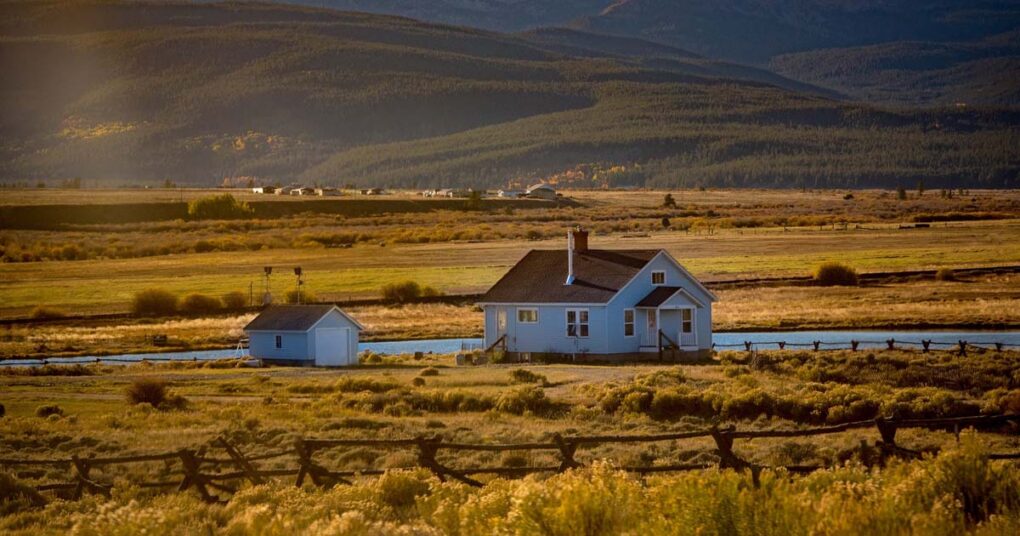
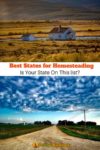
You might think the land is the most critical element of picking a homestead location. However, the state where the land lies
can be just as important. Some states are much better for homesteading.
Here’s why and the best states for homesteading in the USA. If you wish to learn more about homesteading, see these initial posts: Why Option of State Matters for Homesteading No matter how self-reliant you wish to be, you will still be subject to the regional laws and guidelines of the place where your homestead is located.
In some cases, this could squash your dream of being self-dependent. In other scenarios, the laws in fact may operate in your favor.
Here are some of the state laws, policies, and resources to watch out for.
Refunds for Renewable Energy
Establishing a homestead can be pricey, especially if you wish to install renewable energy like solar. The federal solar tax credit (ITC) enables you to deduct a few of the expense of your solar panels from your taxes.
On top of this, lots of states or municipalities offer extra tax refunds or incentives for going solar. You can conserve a great deal of money on initial expenses by choosing one state over another.
Rate for Excess Solar (Net Metering Policies)
Another thing to think about in concerns to homestead area is net metering policies. Net metering permits you to offer excess generated electrical energy back to the power company.
Some states have terrible constraints on net metering. For example, you may not be permitted to offer excess electrical power if your planetary system is over a specific size.
By contrast, some places utilize net metering to incentivize house owners to install solar and buy back electrical energy at prices higher than retail value. You can discover more about net metering policies here.
Net metering policies won’t matter if you wish to detach from the grid totally.
Being Legally Permitted to Remove from Grid
Wish to detach from the grid entirely and rely just by yourself electrical energy and water source?
In most areas, it is in fact unlawful to detach from the grid!
These laws are normally decided on a local level and not state level, so you’ll have to carefully investigate the laws of your prospective homestead location.
Read:
State Homestead Laws
Homestead laws enable individuals to state all or part of their land as a “homestead.” There are 2 main advantages to doing this:
- Homestead is protected from lenders: The homestead can not be seized due to unpaid debts, individual loans, medical costs, etc.
- Reduced property taxes: In many cases, the homestead won’t count toward your property taxes. In locations with high property taxes, this can amount to substantial annual savings.
Homestead laws vary significantly by state. Normally, they define a precise quantity that is safeguarded. For instance, Massachusetts has a high homestead exemption amount of as much as $500,000. Arkansas lets you safeguard your whole home. By contrast, Kentucky only safeguards $5,000.
The homestead protection quantity isn’t always the like the quantity that gets excused from your property taxes (if any).
For more on this, read our post about Homestead Declaration.
Property Taxes
When you homestead, your property is your main property. Property taxes can be very high if you have a large, valuable piece of land. In the long run, purchasing a pricier piece of land frequently makes more sense, but in a state with lower property taxes.
As discussed above, some state homestead laws enable you to subtract the value of your homestead from your property taxes.
For instance, a state may have a $50,000 homestead property tax exemption. If your little homestead is valued at $75,000, you only need to pay property taxes on $25k of it. So, even if the state real estate tax are high, you may not have to pay much thanks to an exemption.
Environment & Natural Resources
I often see Arizona and Nevada in lists of the best states for homesteading. Sure, land in those states might be really low-cost– however it is low-cost for a reason!
You’ll have difficulty living off the land without natural deposits like water and rich soil. Environment is also very crucial, especially for amateur homesteaders.
The growing season is very brief in colder locations like the northern states. You can still homestead there, but the learning curve is greater.
I suggest taking a look at the USDA Hardiness Zone map. Zones 6a to 8b are normally best for homesteading. Warmer zones appropriate for growing however are typically more susceptible to natural catastrophes.
Community & Remoteness
Does your vision of homesteading involve living far from civilization and going months without seeing anyone? Then, you won’t care as much about roadway conditions, schools, and the variety of farmers’ markets close by.
But perhaps you picture a close-knit community that helps each other with jobs, trades homemade items, and uses support.
In this case, you will want to choose a state with more homesteaders and services. For example, Oregon uses homesteaders lots of grants and educational chances. Plus, there are lots of farmers marketers around the state for selling your products.
Disaster Safety
States like Florida, Texas, and Louisiana may be excellent in some aspects for homesteading, but they are likewise really vulnerable to cyclones and flooding.
It’s much more difficult to evacuate when you have a homestead, specifically with animals to care for. So, think twice prior to homesteading in a location prone to disasters.
Learn more about the states with the least natural disasters.
Homeschooling Laws
If you have kids and want to homeschool them on your homestead, you’ll need to consider those laws, too. Some of the very best states for homeschooling are Texas, Oklahoma, Missouri, Iowa, Illinois, Indiana, and Michigan.
See a map with homeschooling laws here.
Whether You Certify As a Farm
Lots of states supply numerous tax advantages to farmers, such as exemptions or rebates on property or sales taxes. There are also plenty of tax deductions for supplies like seeds, feed, and equipment.
In some states, it’s simple to qualify as a farm. For example, New Jersey just needs you to have 5 acres and offer an average of $1,000 every year to be a farm. Some states are much stricter, though, so inspect the local laws.
Best States for Homesteading
There are a lot of factors to consider when selecting the best state for homesteading, and much of these elements are very individual in nature.
I have actually tried to be objective and picked the leading states based upon all the abovementioned aspects, like taxes, favorable homesteading laws, and climate. Here they are!
1. Iowa
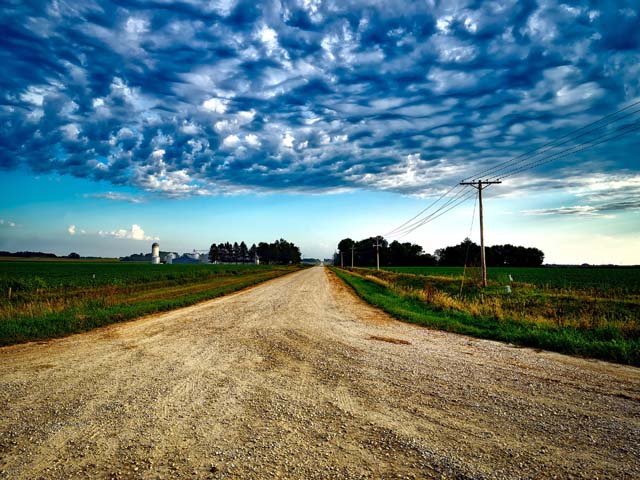
Iowa has a few of the most arable land in the United States, that makes it great for beginning a self-dependent homestead. Since the state is big
on farming, you’ll be in excellent business with many of your next-door neighbors growing food. The expense of living in Iowa is low. Yet, the school system is still excellent, and nearby Des Moines is bustling with culture
if you feel the requirement to connect. Naturally, there are drawbacks to homesteading in Iowa. The state is mainly flat and aesthetically dull. The winters are some of the worst in the U.S.A.. Depending on your income, the state taxes may get extremely high.
Read more about homesteading in Iowa.
2. Wyoming
Wyoming has a lot of things going all out.
The cost of living is extremely low, there is a low population density and lots of farming land suitable for farming or raising animals.
The vistas are stunning, and you can delight in homesteading in peace in this state.
There are surprisingly many bright days in Wyoming: 114 days of the year are clear, and the state averages over 3,000 hours of sunlight each year– more than even California! Only Arizona gets more sun; a Wyoming homestead could be fantastic for solar energy.
Not everyone will appreciate the remoteness of Wyoming life, though. If you aren’t near a big city or town, you might have to drive long distances to get materials or send your kids to school. There aren’t lots of cultural organizations and just one public university.
3. Arkansas
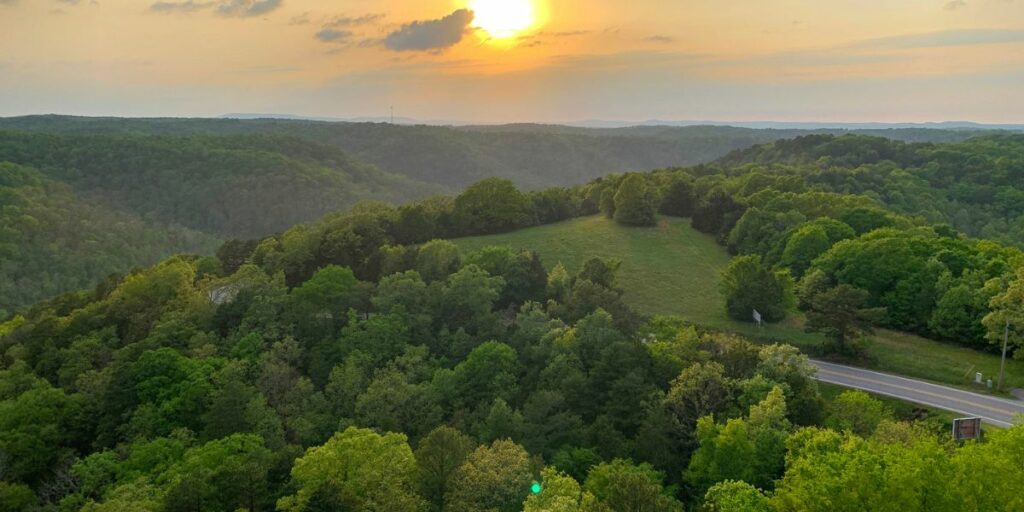
When it comes to homesteading, Arkansas has a lot to offer. Many homesteaders flock to the Ozarks due to the fact that of their charm and natural resources.
There are over 9,700 miles of streams and 600,000 acres of lakes. Find out more about homesteading in Arkansas. Arkansas has a lower knowing curve for homesteading compared to many other states in the USA. The land is mostly arable, and the environment is moderate. The USDA puts most of Arkansas in the strength zone of 6b to 8a, which indicates you get about 200 days in between last and first frost.
The cost of living in Arkansas and land costs are still fairly low. However, it can be difficult to discover land because the majority of it is currently taken by big farming operations.
If you delight in solitude, the state is a fantastic place to live. Nevertheless, if you wish to get included with local communities, you may be a bit upset by the quantity of criminal offense, poverty, poor school systems, and other concerns.
4. Idaho
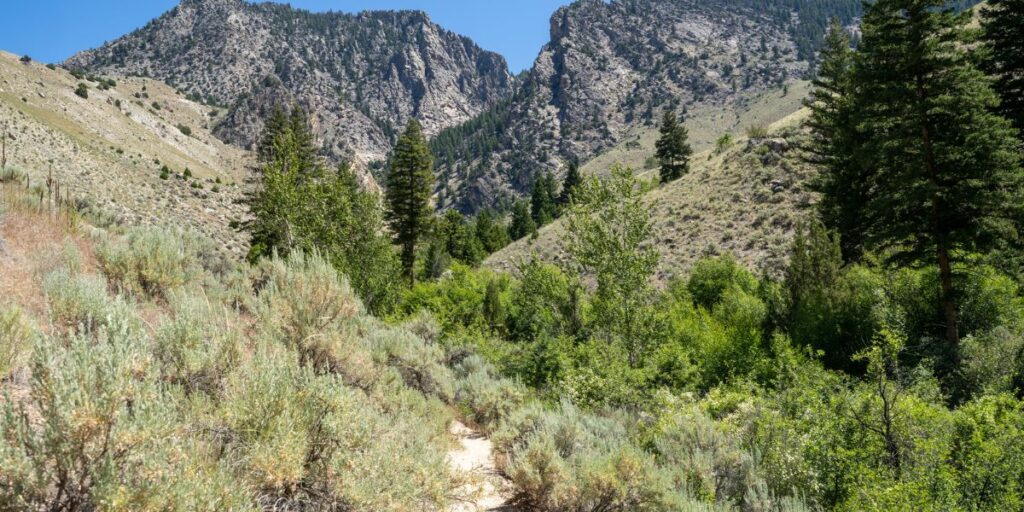
Idaho is another highly-agricultural state in the USA. Since upwards of 15 %of the population is farmers, you will find
a community considerate to homesteading ideals. Find out more about homesteading in Idaho Because of its natural appeal and
low cost of living, many people are flocking to Idaho. The state has actually experienced a huge housing and population boom, making it a bit harder to be isolated. Traffic congestion are likewise becoming more common. Do not be amazed if land costs in Idaho spike.
5. Oregon is ending up being an increasingly popular state to
relocate to, especially with Californians who wish to get away the rat race and high expense of housing. Nature fans will never be bored in Oregon due to the fact that of all the public land that is open to anybody
. There are beaches for browsing and diving, forests for hiking and camping, and even deserts. The expense of living in Oregon is still quite high, and typical home values are one of
the highest in the nation. But, in spite of this, farmland in Oregon is still very budget-friendly. Oregon has a strong homesteading culture and over 30,000 small farms in the state. There are a lot of resources to support your homesteading endeavors, like farmers ‘markets where you can sell food, totally free academic opportunities for farmers, and grant programs. 6. Indiana In specific, the southern half of Indiana is particularly helpful for homesteading.
It has a warmer environment with fewer days of harsh weather, so you’ll have a longer growing season and have the ability to diversify your crops. The southern half is also less inhabited than the north. While homesteading hasn’t removed in Indiana as much as in some other states, it still has a long farming tradition.
There are over 56,000 farms in the state, and 96% are small, family-owned operations. Since there are currently so many farmers, finding economical land for your homestead can be challenging. Living in Indiana is cost effective if you can swing the preliminary high land rates. The taxes are manageable
(at least compared to most of the country ). The state likewise has lots of stunning green areas; it’s not all simply corn fields! 7. Virginia When it pertains to growing your own food, Virginia is one of the best states. It is in the USDA Strength Zones of 5a to 8a, which implies it doesn’t get
severe highs or lows. Initially, frost does not struck under the under of November for some areas, which gives you nearly 200 days of frost-free growing. Virginia is more populated than other states, so you’ll have difficulty discovering land if you wish to be reclusive. Farmland is expensive, and while property taxes are low, the income tax is high. You may also be frustrated by noise from the lots of highways or the noise of jet airplanes overhead from the close-by military bases.
However, the greater population means more resources like schools and task opportunities (in case you do not intend on homesteading as your main task). 8. North Carolina No, you won’t find numerous homesteaders on the coast of North Carolina. Nevertheless, the western part of the state is terrific for homesteading. A great deal of individuals select to get land in the mountains. It’s not as appropriate for growing food however is excellent for raising goats for milk. True, the western part of the state does not have as warm of a climate as the eastern part. Nevertheless, the weather is still moderate, and you get a relatively long growing season. There are likewise wild berries, mushrooms, and other plants you can forage or grow. Being away from the coast also puts you even more out of danger from the numerous typhoons that North Carolina has each year. Land in North Carolina can be costly, and the state income and sales taxes are likewise high. Nevertheless, the state does have some laws favorable to homesteading and great rebates for setting up planetary systems. 9. Missouri is an exceptional state for homesteading because of its long farming custom. You’ll find a neighborhood of people who understand all about self-sufficient living. There are almost 95,000 farms in Missouri, most of which are family owned and under 300 acres. The local laws tend to be favorable to homesteading.
Much of the state is great for growing food, though there are lots of areas where the soil is rocky or does not have wood for building and fuel. Sadly, the very best homesteading land can be pricey to purchase. Home and sales taxes are moderate, however the state income tax is high. Missouri experiences all four seasons, though the winters tend to be fairly mild,
and the summertimes aren’t as bad as its southerly neighbors. The place does mean Missouri typically gets struck by natural catastrophes like flooding, twisters, and ice storms– so be prepared. What do you believe is the best state for homesteading? Let us understand in the comments below.+Resources

